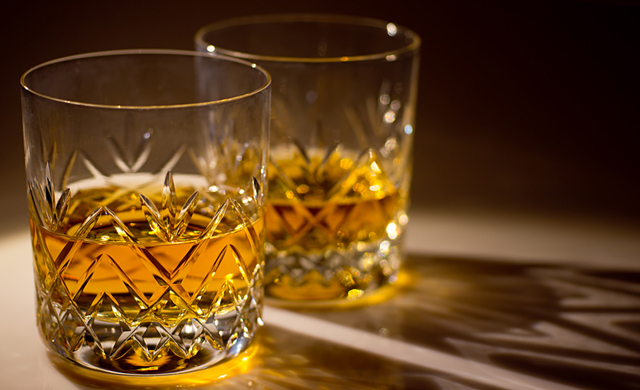Secrets of the whisky blenders
Nick Hammond meets a master whisky blender in a secret Hebridean location


There’s a thin, black dusting of mould on the dank walls and the air is heady with fumes. As Ron Morrison leans over the cask, he inhales deeply through his nostrils and a flicker of a smile crosses his face.
This is his studio; the spirit inside the cask is his muse. He will work his mojo on this liquid and, ultimately —although perhaps not for many years yet—he will create something connoisseurs and collectors will clamour for. Ron is an independent whisky bottler. His is a strange and secretive world, so much so, that I can’t tell you exactly which distillery cellar we’re currently exploring on this fine Hebridean spring morning. But we’re here inspecting one of Ron’s casks, to see if it’s worthy of his spellbook. Producing Scotch as you know it is something of a closed-shop operation.
It’s run by family tradition and, these days, corporate conglomerates, which churn out the familiar brands and bottles you’ll perhaps buy from your liquor merchant. But there is another way. If you dig a little deeper, you may unearth a gem. ‘I can access whiskies that most others can’t,’ Ron explains modestly with a knowing wink. ‘I have a good contacts book.’ This is how it works. Master Blenders from across the 100 or so Scotch distilleries have, for centuries, met quietly to exchange casks. They do this, without publicity or fanfare, purely as a practical necessity. With each distillery supplying only its own distinctive style of whisky, variations on a theme are needed to create the necessary palette to blend popular whiskies.
The rage for single-malt whiskies is a relatively new occurrence; the mainstay of Scotch whisky has always been the blend, hence the clamour for flavours from every corner of the Scottish whisky world The blenders tell each other what they require for the next year’s work; a cask from here, a cask from there, something old, something new. They take delivery of these whiskies— no money changes hands, it’s quid pro quo—and they’re stored wherever necessary to create the special projects each blender has in mind.
Sometimes, the blender may overestimate the required number of casks and have a surplus. And that’s where Ron comes in. ‘By keeping my ear to the ground, I know roughly what’s available at any one time,’ he says over a dram at the distillery bar. ‘Then, it’s a question of hitting the road and visiting a cask that interests me. What can I buy it for?Has it got potential to be something special? You can’t teach what I do, it comes from here,’ as he taps his nose, ‘and here,’ gently tapping his forehead. Another smile. ‘And that’s what makes it so difficult—and so rewarding when you get it right.’
Robert Graham—the independent bottling business Ron owns —has been rewarded with an astonishing run of accolades, culminating in both Gold and Silver in the International Spirits Challenge 2013. This, for such a tiny player up against the ‘big boys’, is, frankly, astounding. ‘It’s given us a terrific boost,’ Ron says. ‘To win the biggest award in whisky is validation for all that goes into creating each bottle.’
So how does he decide what to do with a whisky once he’s tasted it, smelled it and decided it has potential? ‘I listen to my palate. I’ve been involved in the food and drink industry for decades and I have a decent palate. I tell my mind to be still and I let my palate take over. It tells me what’s there and what could be there. And then I make it happen.’
Exquisite houses, the beauty of Nature, and how to get the most from your life, straight to your inbox.
The original spirit might be transferred to new casks—perhaps a sherry butt or something in oak—andmoved specifically to subject it to new atmospheres, aromas and influences. It may be stored at a distillery by the sea, perhaps. This, of course, takes money and lots of time.
Finally, when Ron decides the time is right, taking into consideration the levels of alcohol (whisky must be at least 40% proof to be called whisky) and the optimum ageing of the spirit, the whisky will be bottled. It’s art, craft and alchemy and no computer or factory could replicate it.
There are limited numbers of each new creation available, perhaps 300 or so bottles of liquid gold. Once they’re gone, they’re gone, leaving nothing but a lingering taste on the palate. I leave Ron down in the cellars, walking through the rows of barrels as a chef may walk through his larder. The Whisky Warlock is dreaming up another dram
Robert Graham (020–7624 3351; www.robertgraham1874.com)
Limited-edition whiskies worth seeking out
Littlemill Treasurer
The lowland distillery of Littlemill has been closed for more than 20 years and this bottling from 1985 has a delightful ginger spice, £175 (0131–226 1874; www. whisky-cigars.co.uk) Springbank 21 Year Old Masses of flavour and a soft, rounded mouth feel combine with heather, honey and an ethereal tang of smoke. Heavenly, £498 (0800 051 7737; www.abbeywhisky.com)
Deanston 1994 19 Year Old
Only 100 bottles of this delicious whisky were made. A dry, sherry finish, long in the fruits, £125 (0131–226 1874; www.whisky-cigars.co.uk)
* Follow Country Life magazine on Twitter
